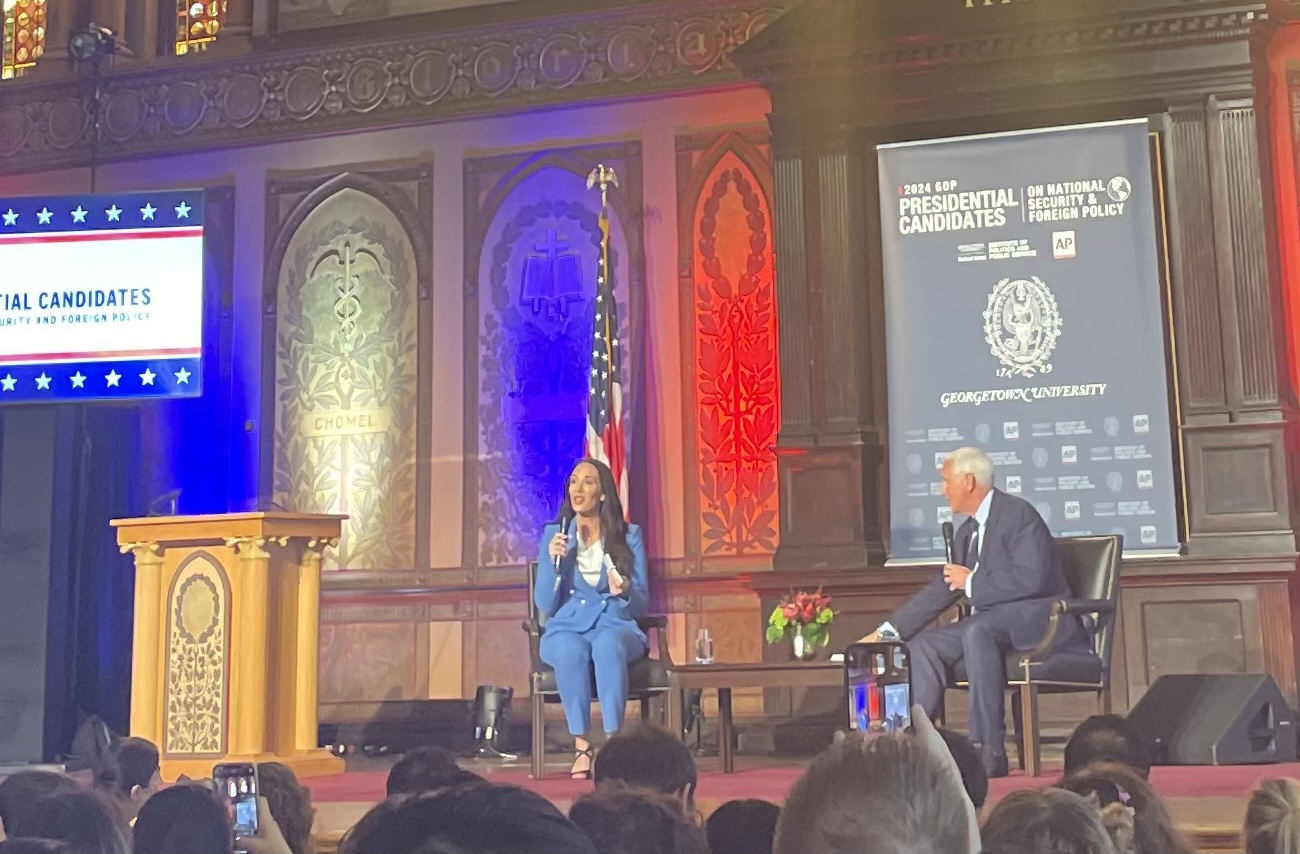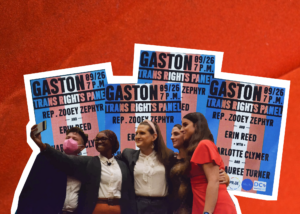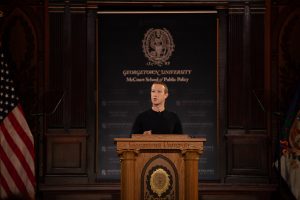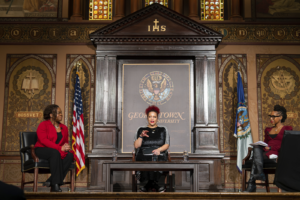Former Vice President and GOP presidential candidate Mike Pence spoke to Georgetown students, faculty, and livestream attendees in Gaston Hall on Oct. 3. During the hour-long event, Pence fielded questions from Associated Press (AP) reporter Meg Kinnard, as well as from students at Georgetown and three other universities joining over live video feed about how he would handle national security and foreign policy, if elected.
The discussion with Pence is the first in a series of conversations with the 2024 Republican presidential candidates co-hosted by AP and the Georgetown Institute of Politics and Public Service. All candidates who qualified for the first GOP debate were invited to Georgetown to speak on national security and foreign policy before the first Republican primary on Jan. 15.
Pence’s appearance comes as he struggles to gain ground in a crowded Republican field, currently polling at an average of 3.4 percent, according to polling site FiveThirtyEight. Pence trails the Republican front-runner and former President Donald Trump by over 50 percent.
The discussion drew less pushback than Pence’s visit to Georgetown last year. During his speech in Gaston Hall on Oct. 19, 2022, students organized a walkout, speeches, and protests in response to Pence’s support of anti-LGBTQ+ and pro-life policy, including bills that allow businesses to discriminate against LGBTQ+ individuals and ban abortions nationwide. This year’s event saw minimal interruption in comparison, save for one student who left the auditorium yelling “Trump 2024!” with a raised fist.
Students pressed Pence on foreign policy issues that included the war in Ukraine and peace-building in the Nagorno-Karabakh region, where ethnic Armenians have been forced to flee after an Azerbaijani military assault. Pence also spoke on the use of the Chinese social media app, TikTok, and the role of the U.S. in the global response to climate change. His responses spoke to a foreign policy rooted in American interests, as he emphasized that “a strong America is a secure America, and a secure America is the pathway to a stronger world.”
The discussion opened with the former vice president’s stance on the ongoing conflict in Ukraine. Pence stated that, if elected, he would continue to send aid to support the Ukrainian military in repelling the Russian invasion. Pence also emphasized that supporting Ukraine is in America’s national interest, adding that if the world allows Russia to overrun Ukraine, he believes it gives “a greenlight for China to move against Taiwan.”
Pence repeatedly pointed to China as a global threat to the U.S. economy and national security. He emphasized that the U.S. military is the strongest in the world, but expressed concerns over China’s military growth as it is “working overtime to catch up.” As China’s influence continues to grow, he argued, so must the U.S. military.
“A strong America is a secure America, and a strong America is the pathway to a more peaceful world,” Pence said in encouragement of increased U.S. military funding.
Pence also addressed China’s influence in Africa, calling on the U.S. to create a “21st century Monroe Doctrine”—a reference to an 1800s policy in which political or military intervention in the Americas was regarded as a U.S. threat. He said that his administration would make it difficult for investments that could undermine the U.S.’s view of freedom in the Western hemisphere.
Turning to Chinese technology, Pence answered a question about TikTok—the China-based social media platform—to scattered laughter from students in the audience.
“I’ll do what I can as President of the United States to make sure that we don’t have a platform operating in America that compromises the privacy rights of Americans,” Pence said.
Later, when asked about the U.S’s role in addressing climate change, Pence deflected responsibility onto China and India. Although Pence stated that the U.S. should commit itself to promoting clean water and land, he said he would not take any action that would “hamper” the U.S. economy, such as substantially cutting fossil fuel usage.
Religious freedom was another point of discussion. When asked his thoughts on the current state of global religious liberty, Pence shared that his goal is “to continue to be a champion in religious liberty around the world.” He added that while he cherishes his own Christian faith and biblical views, he is determined to “fight for every American to believe or not believe.”
As the historic news broke that the U.S. House of Representatives removed Kevin McCarthy as its speaker in the middle of the event, Kinnard pivoted from student questions to inquire about Pence’s reactions.
“What sort of a message do you see something like this sending to other countries about the stability of the U.S. government?” she asked.
Pence paused for more than ten seconds before responding.
“Chaos is never America’s friend… I’m deeply disappointed that a handful of Republicans would partner with all the Democrats in the House of Representatives to oust the Speaker of the House,” Pence said, after his silence.
Throughout the event, Pence also criticized President Joe Biden, who is running for reelection in 2024, on his foreign policy approach. Pence repeatedly focused on how he believed that Biden’s decision to withdraw U.S. troops from Afghanistan made the U.S. look weak on the world stage, though the withdrawal began during the Trump-Pence administration.
Concluding the event, Pence claimed that his administration would aim to promote democracy and broker peace deals, while ensuring the U.S.’s position as the leader of global politics.
“If I’m President of the U.S., I will bring people to the table,” he said.







